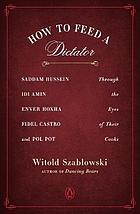
How to Feed a Dictator
Saddam Hussein, Idi Amin, Enver Hoxha, Fidel Castro, and Pol Pot Through the Eyes of Their Cooks
فرمت کتاب
ebook
تاریخ انتشار
2020
نویسنده
Antonia Lloyd-Jonesنویسنده
Antonia Lloyd-Jonesشابک
9781101993392
کتاب های مرتبط
- اطلاعات
- نقد و بررسی
- دیدگاه کاربران
نقد و بررسی

January 13, 2020
In this heavily researched history, Polish journalist Szablowski (Dancing Bears) shares the stories of six personal chefs of five dictators, among them Fidel Castro, Saddam Hussein, Idi Amin, Enver Hoxhas, and Pol Pot. These are the kinds of stories only a chef could know: whether it’s being accused of poisoning Amin and being exiled, or having to pay Hussein for the wasted meat if he found it oversalted, the chefs Szablowski interviewed divulge morsels of character from their respective rulers. Each chef elaborates on the dictator’s favorite dish—such as Amin’s Roasted Goat (stuffed with “rice, potatoes, carrots, parsley, peas,” recalls chef Otonde Odera) and Hussein’s Thieves’ Fish Soup—and tells stories of their unsettling attributes (Pol Pot “had an incredible sense of humor. He was like a clown, he really was,” his unnamed chef recalls) and, in some cases, their eventual demise. Throughout, Szablowski entertains with disturbing rumors, such as Amin eating human flesh (whatever the case, his chef never cooked it for him), and strange obsessions (Castro preferred the milk from a single cow named Ubre Blanca, or “white udder”). Food and history buffs will find these firsthand accounts irresistible.

February 1, 2020
A Polish journalist's account of his conversations with the personal chefs of five notorious dictators. Szablowski (Dancing Bears: True Stories of People Nostalgic for Life Under Tyranny, 2016, etc.) became fascinated by the relationship between dictators and their cooks after watching a film featuring Yugoslavian dictator Tito's personal chef. In a project that took several years to complete, the author traveled the world to interview the people who had cooked for Saddam Hussein, Idi Amin, Enver Hoxha, Fidel Castro, and Pol Pot. Alternating between third-person reports of Szablowski's interviews and first-person accounts from interviewees, the author shares intimate historical insights into the meaning of life under dictatorship. Szablowski begins with--and periodically revisits--a section called "Snack," which deals with Young Moeun's memories of a youth spent cooking for Pol Pot, whom she remembered chiefly for his good looks and gentleness. The next section, "Breakfast," recounts conversations with Hussein's cook, Abu Ali, who recalled his employer's generosity and fondness for "bastirma" (dried beef). "Lunch" presents the story of Amin's cook, Otonde Odera, who made "nutritious pilafs [and] baked fish" while also managing to survive the political intrigue that nearly cost him his life. "Dinner" focuses on Hoxha's cook, Mr. K., who had to "cope with deficit items, unavailable in [Stalinist] Albania" while cooking meals to soothe his "agitated" boss. "Supper" deals with two of Castro's chefs. One, Erasmo, thrived under the dictator and became a prosperous restaurateur while the other, Flores, lost his mind and ended up living in poverty. The final section, "Dessert," continues Moeun's complimentary musings on Pol Pot, which she intersperses with recollections of life as a member of the Cambodian Communist Party. Two strengths of Szablowski's book are its originality and topicality in a world increasingly governed by political strongmen. However, the complex, fractured structure creates an uneven narrative that is sometimes difficult to follow. A flawed but intriguing project.
COPYRIGHT(2020) Kirkus Reviews, ALL RIGHTS RESERVED.

March 1, 2020
An acclaimed Polish journalist interviews the personal chefs of infamous tyrants in search of a new perspective on horrible people. Szablowski (Dancing Bears, 2018) tracked down people who had cooked for Saddam Hussein, Idi Amin, Enver Hoxha, Fidel Castro, and Pol Pot. Their stories did not come easily; fear, secrecy, and loyalty all die hard. Szablowski shares some interesting anecdotal revelations. Pol Pot didn't actually like Cambodian food, preferring Thai and Chinese versions of traditional dishes. Hussein expressed his sadism with hot sauce. Castro really, really enjoyed ice cream. But the more fascinating thread may be the chefs' biographical narratives, which present variations on the themes of rare opportunity, terrifying pressure, and lives permanently warped by proximity to power and cruelty. It's frequently ambiguous whether the chefs are accessories to atrocities or victims themselves. And while Szablowski grapples with questions of trustworthiness and reliability of information?he never does get a straight answer out of Amin's cook about the cannibalism claim?the messier issue may be whether scrutiny of dictators' gustatory preferences risks humanizing them and if so, to what end.(Reprinted with permission of Booklist, copyright 2020, American Library Association.)

























دیدگاه کاربران